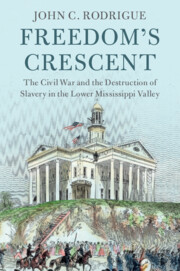Book contents
- Freedom’s Crescent
- Cambridge Studies on the American South
- Freedom’s Crescent
- Copyright page
- Dedication
- Epigraph
- Contents
- Figures
- Acknowledgments
- Abbreviations
- Additional material
- Introduction
- Prologue Life – and Labor – on the Mississippi
- Part I From War for Union to Military Emancipation, 1860–1862
- Part II From Military Emancipation to State Abolition, 1863
- 5 “The Return of the Seceded States to This Union as Slave States”
- 6 “Repugnant to the Spirit of the Age”
- 7 “The Greatest Question Ever Presented to Practical Statesmanship”
- 8 “The Name of ‘Slavery’”
- 9 “Repudiating the Emancipation Proclamation and Reestablishing Slavery”
- Part III Abolition: State and Federal, 1864
- Part IV The Destruction of Slavery, 1865
- Epilogue Memphis and New Orleans: May 1–3 and July 30, 1866
- Bibliography
- Index
7 - “The Greatest Question Ever Presented to Practical Statesmanship”
from Part II - From Military Emancipation to State Abolition, 1863
Published online by Cambridge University Press: 19 January 2023
- Freedom’s Crescent
- Cambridge Studies on the American South
- Freedom’s Crescent
- Copyright page
- Dedication
- Epigraph
- Contents
- Figures
- Acknowledgments
- Abbreviations
- Additional material
- Introduction
- Prologue Life – and Labor – on the Mississippi
- Part I From War for Union to Military Emancipation, 1860–1862
- Part II From Military Emancipation to State Abolition, 1863
- 5 “The Return of the Seceded States to This Union as Slave States”
- 6 “Repugnant to the Spirit of the Age”
- 7 “The Greatest Question Ever Presented to Practical Statesmanship”
- 8 “The Name of ‘Slavery’”
- 9 “Repudiating the Emancipation Proclamation and Reestablishing Slavery”
- Part III Abolition: State and Federal, 1864
- Part IV The Destruction of Slavery, 1865
- Epilogue Memphis and New Orleans: May 1–3 and July 30, 1866
- Bibliography
- Index
Summary
Contests between free-state and conservative Unionists in Tennessee and Louisiana continue through summer 1863. Tennessee conservatives conduct a gubernatorial convention that Lincoln refuses to recognize. Despite Lincoln’s rejection, Louisiana conservatives also plan elections for the fall, while free-state Unionists – despite Lincoln’s support – encounter various challenges. Free-state Unionism arises in Arkansas after Federal capture of Little Rock in September 1863. In North, debate over Reconstruction intensifies after Federal victories at Vicksburg and Gettysburg, and antislavery advocates warn against any reunion that does not require rebellious states to abolish slavery in state constitutions, else slavery may survive war. Northern debate over Reconstruction intersects with contest between free-state and conservative Unionists in Louisiana and Tennessee.
Keywords
- Type
- Chapter
- Information
- Freedom's CrescentThe Civil War and the Destruction of Slavery in the Lower Mississippi Valley, pp. 145 - 164Publisher: Cambridge University PressPrint publication year: 2023

